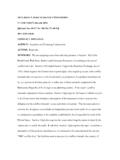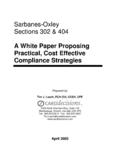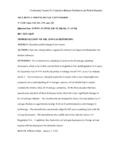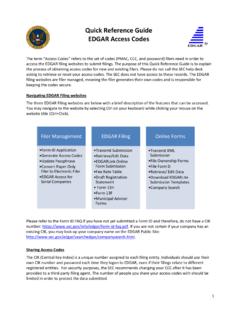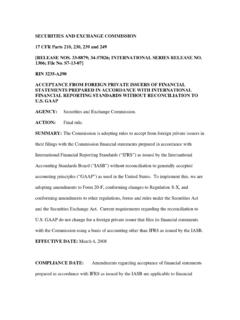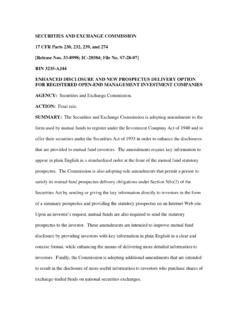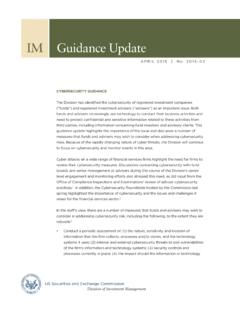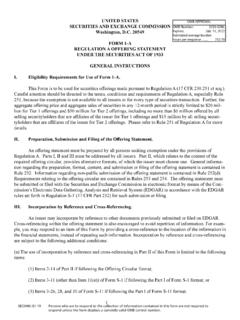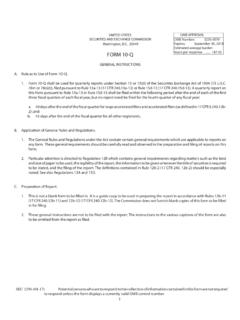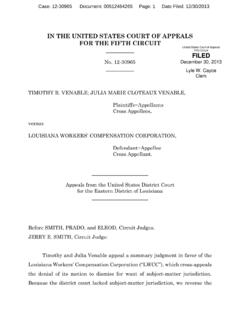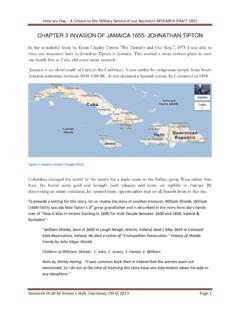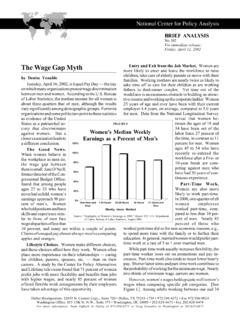Transcription of VENABLE;, - SEC
1 VENABLE;, 8010 Towers Crescent Drive,Suite joa Vienna,Virginia 22182-2707. Telephone 703-760-1600. Facsimile 703-821-8949. Securities Exchange Act 15(a). October 20, 2005. Ms. Catherine McGuire Chief Counsel and Associate Director Division of Market Regulation Securities and Exchange Commission 100 F Street, Washington, 20549. Re: TEOCO Corporation -Request for No-Action Advice Dear Ms. McGuire: We are counsel to TEOCO Corporation, a Delaware corporation (the "Company" or "TEOCO"). The purpose of this letter is to request, on behalf of TEOCO, that the Staff advise that it will not recommend that the Securities and Exchange Commission (the "Commission").
2 Take any enforcement action under Section 15(a) of the Securities Exchange Act of 1934, as amended (the "Exchange Act"), if the Company adopts and implements a stock sale and repurchase program for its employees and certain other eligible participants pursuant to the terms of a Stock Sale and Purchase Plan (the "Plan"), which is more fully described herein, without either the Company, or those directors and employees of TEOCO who oversee and administer the Plan, registering as a broker andlor dealer pursuant to Section 15(b) of the Exchange Act. Incorporated in 1994, TEOCO is a leading provider of automated cost and revenue management solutions for the telecommunications industry.
3 The Company engages in two primary lines of business: (1) Telecom Solutions (consisting of network cost and revenue management software and services for telecommunications companies and their enterprise customers); and (2) (consisting of a B2C and B2B web-based internet platform to connect businesses with local purchase-ready buyers). Since its organization, TEOCO has been an employee-owned company and has provided all of its current employees and directors with the opportunity to obtain shares of its common stock through stock option and incentive plans. The Company's objective in providing its Ms. Catherine McGuire Chief Counsel and Associate Director October 20,2005.
4 Page 2. employees with an equity interest in the Company is to give them a stake in the Company's success and thereby enable the Company to attract and retain highly qualified officers and other employees. As of September 1, 2005, the Company had 64 stockholders, all of whom were current or former employees or directors of the Company. In addition, as of September 1,2005, there were approximately 130 current and former employees and directors who held stock options granted by the Company. TEOCO has experienced significant growth, which it has attributed in large part to the Company's employee-focused philosophy.
5 The Company's stock, however, is not registered under Section 12 of the Exchange Act and there is no public trading market for the stock. Moreover, the stock is subject to transfer restrictions.' At this time, TEOCO has no intentions or plans to list its stock on any exchange or market or effect a public offering of its stock. Because of this lack of liquidity, the ability of a stockholder of TEOCO to realize a financial return from growth in the Company's value has been limited. In order to provide some measure of liquidity to employees of the Company, and afford employees an opportunity to acquire or increase their equity stake in the Company, TEOCO is proposing to establish and implement the Plan.
6 Under the Plan, employees and certain other eligible participants holding TEOCO common stock (the "Common Stock") will be able to sell their shares back to the Company on either one or two occasions annually on dates fixed by the Company, and on those same occasions, current employees and directors will be offered the opportunity to buy Common Stock from the Company. The Plan will include the following features: 1. Purpose. The Plan is intended to provide liquidity for "Eligible Participants" (as defined below) who own Common Stock, and to offer certain Eligible Participants an opportunity to acquire an equity interest in the Company.
7 This is achieved through a program that permits Eligible Participants to sell shares of Common Stock to the Company, or buy shares of Common Stock from the Company, on up to two predetermined "trade" days annually (each a "Trade Date"). The Plan is designed to qualify as a "compensatory benefit plan" within the 1 Pursuant to stock repurchase agreements with the Company's employees, resale of shares of TEOCO stock is subject to a right of first refusal in favor of the Company, with other transfers permitted only to certain members of an employee's family or trusts. Stock repurchase agreements with its employees also provide that, after an employee's termination, the Company may elect to buy the departing employee's stock unless certain conditions are met by the employee.
8 Ms. Catherine McGuire Chief Counsel and Associate Director October 20,2005. Page 3. meaning of Rule 701 ("Rule 701") under the Securities Act of 1933, as amended (the "Securities AC~").~. 2. Administration. A committee appointed by the Company's Board of Directors (the "Committee") will administer the Plan. The Committee is required to establish guidelines for the operation of the Plan, including but not limited to provisions dealing with insider trading. 3. Participants. The Plan will permit current officers and other employees, as well as directors of the Company, to purchase shares of Common Stock directly from the Company and will permit these persons and certain other eligible participants3 (collectively, "Eligible Participants") to sell to the Company shares of Common Stock they own and have held for at least one year.
9 These transactions may occur only on up to two Trade Dates each year as designated by the Company. Any Eligible Participant who expresses a desire to sell or purchase shares of Common Stock with respect to a specific Trade Date would nevertheless be ineligible to participate for one or more of the following reasons (each such person, an "Ineligible Person"): (1) the transaction by such person in the Common Stock would result in a violation of applicable law ( , such person's participation would be impermissible under Rule 701); andlor (2) such person's participation would involve a breach of fiduciary duty by such person, the Company, or any member of the Committee.
10 The Committee will determine whether any Eligible Participant is an Ineligible Person. This authority must be exercised in a non-arbitrary and non-discriminatory manner, consistent with applicable law and all of the terms and conditions of the Plan. 2. We believe that the terms of the Plan are consistent with the Rule 701 plan for which the Staff granted no-action relief in Marshalls Finance Limited and Lasser Marshall, Inc., SEC No-Action Letter (available June 15, 1993). These other eligible persons consist of stockholders who are (1) the Company's former employees or (2) a current or former employee's immediate family members ( , an employee's child, stepchild, parent, stepparent, spouse, former spouse, sibling, or legal dependant), or a trust for the benefit of such employee andlor his or her immediate family members, provided that such employee or immediate family members have more than fiftypercent of the beneficial interest in such trust.

